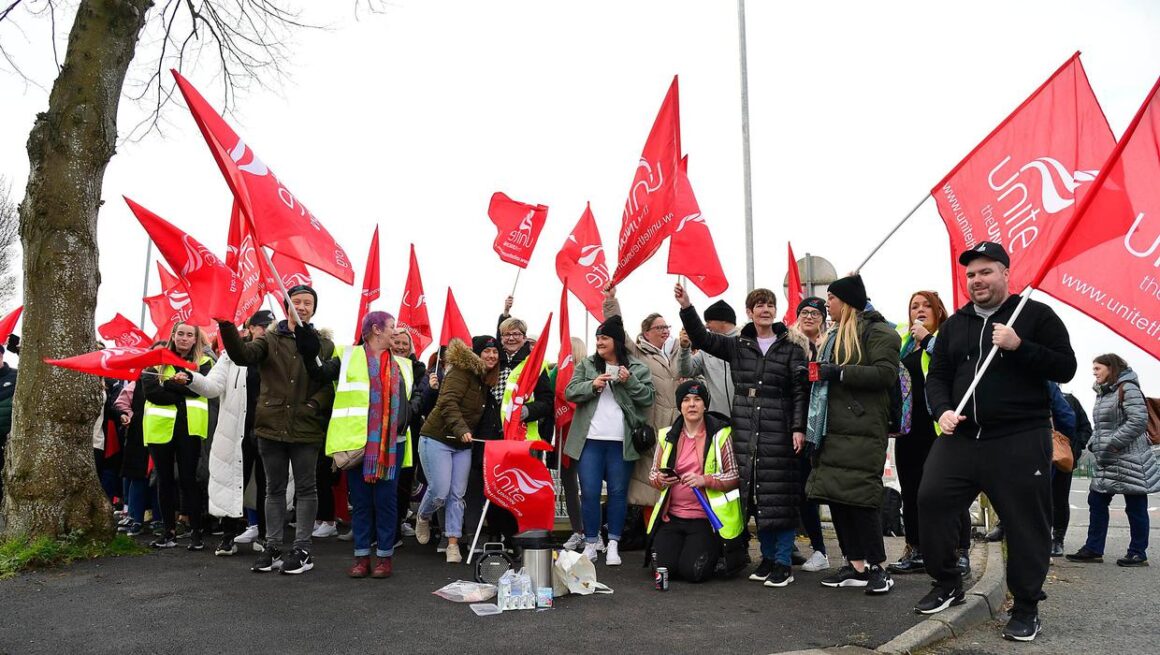By Sean Burns
Barely a day goes by without another horror story hitting headlines, illustrating the reality of the cost of living crisis impacting working-class people’s lives. An article in Forbes magazine published on 21 October, warned that people were taking risks with food, eating it past the use-by date and turning off their refrigerators.
Likewise, a survey of Northern Ireland Parents reported 66% said food prices were one of their top concerns. But this has not gone unanswered. Across Britain and the North, workers have taken to industrial action in even higher numbers. In June 2022 and July 2022, there were 70,500 and 87,600 working days lost to strike action, compare to the 2019 monthly average of 19,500 days. At the top, the establishment finds itself embroiled in one chaotic crisis after another in both Stormont and Westminster. As this sets to intensify the question of both a serious industrial strategy and a political alternative for workers needs to come onto the table.
No faith in Stormont
Despite grandiose statements emanating from politicians in Stormont about the need to tackle the cost of living crisis, the proposed measures are extremely mild. The talk of 400 million in a pot that can be used, while welcome, is extremely inadequate given the scale of the crisis. Meanwhile, the profits of BP have nearly trebled. A slap in the face to those who have seen the price of home heating oil skyrocket.
Much ire has been directed towards the DUP for the current stalemate in Stormont. This is an understandable sentiment when there are resources not being utilised to assist workers. Another election will not end the stalemate. But we must look at the real record of these parties to see where their interests lie. Sinn Féin and the DUP have presided over an administration which has implemented massive austerity attacks on public services.
They have ridden roughshod over workers’ pay, Northern Ireland continues to have the lowest wages in the United Kingdom, and to top it off they intended to cut corporation taxes for the super wealthy! Consistently research shows households were struggling to make ends meet before the current cost of living crisis intensified. The Alliance party, seen positively by many for its “cross-community” stance, do not fare much better. They have consistently and openly supported policies which are detrimental to working-class communities – water charges, increasing tuition fees, welfare ‘reform’, and opposing trade union rights.
Workers show the way
While the Green and Orange parties rely upon whipping up sectarianism to mask their anti-worker politics, on the picket lines workers stand united. From Royal Mail to the Health service, hundreds of thousands of workers are taking strike action to demand fair pay and respect at work. We are united in the common struggle against Capitalism’s driving down of our living standards.
Unfortunately, the boldness shown below is not replicated by the ICTU or TUC leadership. Disgracefully in the summer amidst serious rises in inflation and strike action by workers, the TUC announced on social media to “prepare for a big announcement” only to announce a campaign for a £15 minimum wage an hour by 2030! An increase in the minimum wage is obviously welcome but falls far short of the kind of action we need from the TUC. Locally NIC-ICTU has announced a series of meetings across the North under their “workers demand better” campaign. This is a welcome first step. But it is a long time coming. Thousands of workers have participated in industrial action over the past few months, and there is a glaring need to coordinate and generalise action to tackle the cost of living crisis.
ICTU has been found wanting. They have not provided a serious strategy to bring together disputes, nor have they brought unions together across sectors to maximise the effectiveness of ballots. Now more than ever we need a serious campaign to build for a 24-hour general strike. Such a campaign could not only take up the demands of above-inflation pay increases but also broaden out the struggle to include demands on inflation-linked pay so that workers do not see their pay rises lost to inflation in a matter of months. Likewise, as part of such action, tackling the profiteering of big energy and food companies by demanding the nationalisation of the energy companies would deliver a serious victory for working-class people.
On the political front, ICTU are lacking. Instead of focusing on demanding the return of a Stormont administration which has failed workers. ICTU should be popularising pro-workers socialist policies such as linking wage rises to cost of inflation and renationalising energy and utility companies. This would require the building of a new party that stands as a working-class alternative to the sectarian, pro-big business status quo.












